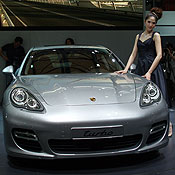
Newsweek International Edition COVER STORY, May 4, 2009
China is now the world's largest market for cars; Chinese leaders aim to own the biggest piece of it
by Melinda Liu, NEWSWEEK
American tastes dominated the world's automotive market for a century, but all that's changing now. Today it's the increasingly well-to-do Chinese car-buyer that industry wants to woo and win, thanks to this incredible fact— China has, over the last three months running, surpassed the U.S. in terms of volume sales of automobiles. Ever wonder why Ford's new Fiesta has an instrument panel that looks like a cell phone? Because that's what's familiar to its target audience of 20- and 30-something Chinese. It's also why Chinese versions of the Fiesta come in sedan size, with four doors, rather than as hatchbacks, which are anathema in the Middle Kingdom.
The future of auto design was on display last week at the Shanghai Auto Show, where, in 30 football fields worth of space, international and domestic carmakers vied for the attention of Chinese consumers. The timing of the biennial event, China's oldest international auto show, was fortuitous. No one expected the Middle Kingdom to nab first place in the global auto market from America for at least another decade, but the financial crisis has had a sharp dampening effect on U.S. sales. The Chinese, meanwhile, spurred on by their government's enormous stimulus package, have kept spending. Beijing's 2009 auto sales target is 10 million units, an increase of 10 percent from 2008, and a figure that would cement its position, with an estimated 1 million more unit sales than the U.S. "No one expected China to emerge as the leading volume market this fast," says William Russo, a Beijing-based business consultant who specializes in the automotive sector. "This will give China a huge say in setting the standards and architecture for the entire industry."
If Beijing gets its way, the future will be small, green and—of course—made in China. The shock of the global financial crisis, and the resulting need to stimulate the auto sector has persuaded Beijing to dig deep into government coffers with more than $733 million to promote the rural sales of small cars and trucks (which domestic makers specialize in) and $220 million to fund and upgrade new green automotive technologies that many consider to be the wave of the future for the industry. Ultimately, Chinese planners want to create a new Detroit—a leaner, meaner, cleaner global automotive hub.
Click here for the entire article...http://www.newsweek.com/id/195095/page/1

